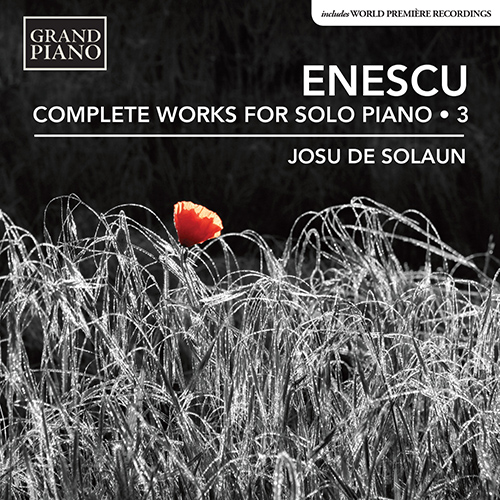
About this Release
“This third and last installment of the complete works for piano by George Enescu features what one could call, in opposition to Rossini’s famous collection of pieces subtitled péchés de vieillesse (sins of old age), the Romanian composer’s péchés de jeunesse (sins of young age). However, these pieces, written in his very early days as a composer, show an audacity, breadth of purpose, and deep understanding of both Germanic and Gallic compositional traditions, that finds almost no equal with another composer of his age in the whole of the 19th and 20th centuries. Amidst Barcarolles, Romances, Preludes, Scherzos, and other such character pieces, a special favorite is the Suite Op. 3, written in what Enescu termed l’ancien style (the old style): Bach seen from the prism of turn-of-the-century Paris, a very different Bach indeed than the one we are now used to.” — Josu De Solaun
ENESCU, GEORGE (1881–1955)
Complete Works for Solo Piano • 3
- Josu De Solaun, piano
This third and final volume dedicated to Enescu’s piano works shows the unique blend of influences he acquired during his teenage years in Vienna and Paris. These start with his Brahms-like treatment of the piano as a symphonic instrument in the Scherzo and Ballade to the infusion of French late-Romanticism and Fauré in the Impromptus. The crowning achievement of these early compositions is the Suite dans le style ancien, Enescu’s first public solo piano opus, a stylised evocation of Bach seen through the prism of turn-of-the-century Paris.
This recording was made on a modern instrument: Steinway, Model D
Tracklist
|
1
Scherzo (1896) * (00:04:00)
|
|
2
Ballade for Piano (1894) * (00:07:49)
|
|
Prélude et Scherzo () (00:10:00 )
|
|
3
Prélude (00:04:10)
|
|
4
Scherzo (00:06:01)
|
|
5
Barcarolle in B-Flat Major (1897) (00:04:28)
|
|
6
La Fileuse in D Major (1897) (00:05:02)
|
|
7
Regrets in G-Flat Major (1898) (00:03:23)
|
|
Suite No. 1 in G Minor, Op. 3, "Dans le style ancien" (1897) (00:20:00 )
|
|
8
I. Prélude: Grave (00:03:29)
|
|
9
II. Fugue: Allegro moderato (00:04:02)
|
|
10
III. Adagio (00:08:23)
|
|
11
IV. Finale: Presto (00:03:50)
|
|
12
Impromptu in A-Flat Major (1898) (00:04:21)
|
|
13
Impromptu in C Major (1900) (00:06:10)
|
|
14
Modérément (1898) * (00:02:22)
|
The Artist(s)
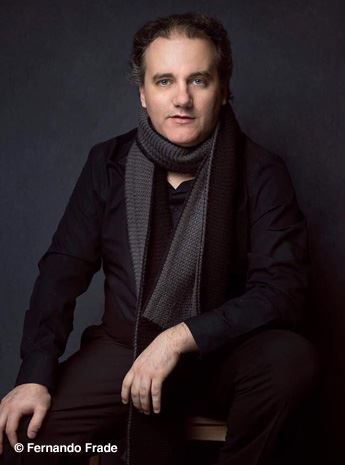
Pianist Josu De Solaun is the First Prize winner of the XIII George Enescu International Piano Competition in Bucharest (previous winners include the legendary pianists Radu Lupu and Elisabeth Leonskaja) and the XV José Iturbi International Piano Competition. He has been invited to perform in distinguished concert series throughout the world, having made notable appearances in Bucharest (Romanian Athenaeum), St Petersburg (Mariinsky Theatre), Washington DC (Kennedy Center), New York (Carnegie Hall, Metropolitan Opera), London (Southbank Centre), Paris (Salle Cortot), Mexico City (Sala Silvestre Revueltas), and all major cities of Spain.
www.josudesolaun.com
The Composer(s)
 In the vast Eastern European diaspora of 20th Century music, few composers can claim the audacity and originality of George Enescu. Enescu was barely in his teens when he commanded the attention of Europe’s musical aristocracy as a virtuoso violinist. In 1895 he entered the Paris Conservatory, where he cultivated his compositional gifts as a student of Fauré and Massenet, astounding all who knew him with his consummate virtuosity at the piano, cello, and organ as well. For nearly a half century the name Enescu was on the lips of every major concert artist. Among them were his classmate at the Conservatoire, Alfred Cortot, his godson Dinu Lipatti; Gustav Mahler, his student Yehudi Menuhin, David Oistrakh, and Clara Haskil, to name only a few.
In the vast Eastern European diaspora of 20th Century music, few composers can claim the audacity and originality of George Enescu. Enescu was barely in his teens when he commanded the attention of Europe’s musical aristocracy as a virtuoso violinist. In 1895 he entered the Paris Conservatory, where he cultivated his compositional gifts as a student of Fauré and Massenet, astounding all who knew him with his consummate virtuosity at the piano, cello, and organ as well. For nearly a half century the name Enescu was on the lips of every major concert artist. Among them were his classmate at the Conservatoire, Alfred Cortot, his godson Dinu Lipatti; Gustav Mahler, his student Yehudi Menuhin, David Oistrakh, and Clara Haskil, to name only a few. Reviews

“…whether because of the unusual programme or the superb interpretations offered by Solaun, we are faced with a collection of music that needs to be listened to, an essential album that promises to delight even the most demanding music lover. ” – Melómano (Spain)

“Full recommendation for these completely outstanding albums, thanks to the indisputable merit of a communicator who is so thoroughly engaged with the music he plays.” – Scherzo

“[…] Josu de Solaun makes a seriously persuasive case for the varied and absorbing piano music in these three discs. […] De Solaun never makes heavy weather of Enescu’s demanding writing, but lets expression lead at all times, no matter how intense the virtuosity. There’s a bouncy vitality to his playing, a warm and intimate approach to phrasing and beautifully mellow tone quality.” – BBC Music Magazine
“De Solaun is a wonderful pianist, especially in the colorful worlds of the Second Piano Suite.” – American Record Guide
“If you have read my previous reviews in this series, you will recall how I have enjoyed the playing of the American-trained Spanish pianist, Josu De Solaun. If Grand Piano is going to plead the cause for long neglected music, you need such dedicated advocates. Technically he is outstanding, and, with a modicum of personal freedom, he has breathed life into the music. A hugely successful series.” – David’s Review Corner

“Technical virtuosity, color, originality and, above all, a musicality in abundance...The technical mastery of Solaun, but also his familiarity and empathy with these pieces, that allow him to go beyond the notes to...infuse them with life...makes listening to this music is a real pleasure. That being said, a reference that no music lover should miss.” – Ritmo
“Everything in these three discs is of the same quality, eloquence and poetry, virtuosity and sense of suggestion, mastery of form and, above all, an intimate understanding of the wandering, free, complex language of rhythms and harmonies that is the genius of Enescu ....How can these keyboard works still not be inscribed in the pantheon of the piano of the early twentieth century, next to those of Busoni, Rachmaninov, opposite the opus of Albéniz, Debussy and Ravel. Mystery.” – ARTAMAG’

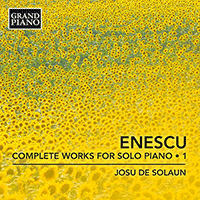
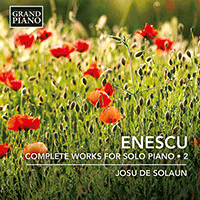
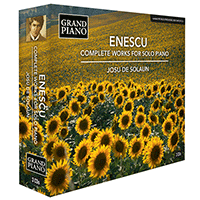
 Grand Piano has gained a reputation for producing high quality recordings of rare keyboard gems. Dedicated to the exploration of undiscovered piano repertoire, the label specialises in complete cycles of piano works by many lesser-known composers, whose output might otherwise have remained unknown and unrecorded.
Grand Piano has gained a reputation for producing high quality recordings of rare keyboard gems. Dedicated to the exploration of undiscovered piano repertoire, the label specialises in complete cycles of piano works by many lesser-known composers, whose output might otherwise have remained unknown and unrecorded.






